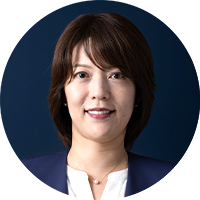Coach's VIEW is a business column authored by executive coaches in COACH A, aimed at providing valuable insights and effective approaches for leveraging coaching to foster organizational and leadership development. The column draws on the latest coaching trends and data, as well as insights from notable global publications on coaching.
Correct Answer Not to Be Found

October 18, 2022

What does an outstanding top management look like?
What does it mean to be successful in corporate management?
I wonder what are the right answers to these questions.
How refreshing would it be if there were absolute answers to these questions. If there are business books titled, "If You Do This, You Too Will Become a Great Top Management!" or, "The 100 Rules for a Successful Corporate Management", I would be tempted to pick them up. Through speaking with many corporates' top executives in coaching sessions, I am often asked to "teach" them the following questions.
- What should I do as an executive?
- What should a CEO be like?
- What am I lacking as a CEO?
Each time I am asked these questions, I feel a sense of helplessness because I do not have the answers. At the same time, I feel the desire to explore as I wonder if there is a correct answer somewhere.
Why Couldn't You Just Teach Me??
"I want to become a full-fledged top executive as soon as possible. I have a clear idea of what I want to do, such as launching a new business and getting it on track, fostering young talents, consolidating overseas subsidiaries, and many other things. However, as a top management, I feel that I am extremely lacking in some way. I am not sure what exactly is lacking. Yuko, you must have met many top executives. Could you tell me what I am lacking as compared to other executives?"
One of my clients said these words to me in a very distressed manner during a coaching session shortly after he took over as CEO. In my eyes, such an outstanding person as him is already a great top executive. I was impressed to see him earnestly searching for "what he should be," and at the same time, I feel his strength as a person for being able to open up about his struggles in that moment.
On the other hand, as he is in a hurry to get the right answer as the top executive "as quickly as possible," he seemed to be more anxious than necessary. What does managing mean to him in the first place? What does he want to achieve so badly that he is in such a hurry? I wanted him to stop for a moment and tell me what was on his mind more freely.
Then, I asked him,
"What kind of company do you want to create?"
His gaze stopped as he looked up slantedly. After thinking for a while, he said plainly, "As I mentioned earlier, we have a lot of work to do, such as launching new businesses, training the next generation, and consolidating subsidiaries."
I asked him, "What kind of changes would take place in the company if you could achieve these goals? What kind of people would be working there?" When I continued to ask him these questions, I noticed he had an irritated look on his face.
"I can't visualize it, and what good does it bring to me if I think about it now? I want to have an awareness of what I should be doing now as an executive."
The session ended up as one that proceeded without much progression.
"Why don't you teach me what to do?"
I think that was what he wanted to say at the end.
There Is a Need for Learning by Trial and Error
One method of learning by artificial intelligence (AI) is reinforcement learning, in which the AI itself learns through trial and error. It might still be fresh in your memory that "AlphaGO," an artificial intelligence developed by Google DeepMind, a subsidiary of Google, shocked the world with its victory over numerous GO(Japanese Chess) masters. AlphaGO's AI leverages reinforcement learning.
In games such as GO, there are no clear correct or incorrect answers, because the situation changes depending on the circumstances and the way the opponent plays. Therefore, the AI first takes action on its own and learns by improving its next action from the results of that first action. The good or bad measurement of an action depends on whether it brings you closer to your goal or not. Points are awarded for getting closer to the goal, and points are deducted for moving away from it. This is how AI's behavior is optimized to obtain high scores.
The approach of "taking action on one's own self and repeating trial and error" is similar to that of an "executive" who searches for "what to do" and corrects his or her course of action as he or she progresses. In other words, executives are also continuous learners. However, for this reinforcement learning to work, there are two important aspects. One is that the objective must be clear, and the other one is that the desired outcome must be clear.
A top management should have both of these aspects clear in mind. He or she should have a clear idea of what he or she wants to do with the company, and what kind of management he or she wants to achieve. They must have exciting aspirations. However, in the midst of having uneasiness over whether or not things are going well now, they tend to forget about these important aspects of management. They may then want to quickly find the right answer based on the experiences of others or their own past experiences to feel relieved. However, even if there are best management practices, they could not be applied 100% to them. There is no one answer that is always right.
The Search for Answers Continue
- What is your purpose for doing this business?
- What do you wish to become in 10 years?
- How do you want to change yourself?
We, coaches, ask our clients about their goals and future vision continuously. Because I ask these questions repeatedly to the same client, he or she sometimes gives me reactions such as, " Hadn't I already told you previously? Are you asking the same questions again?"
However, I believe that the days and times to keep thinking about this may be what is necessary for the top management, since they are always being chased by critical matters all the time. We move forward by trial and error toward our goals and the being we envisioned. It is a very tedious, brain-numbing, endless act of continuous search for the right answer that cannot be found.
I believe that these are the qualities required of a top management.
What does an outstanding top management look like?
What does it mean to be successful in corporate management?
Even if there is no correct answer here and now, we must continue to search together. I believe that this is the role of an executive coach.
*Regardless of profit, non-profit or intranet, secondary use such as copying, diversion, selling etc. is prohibited without permission.
Language: Japanese
